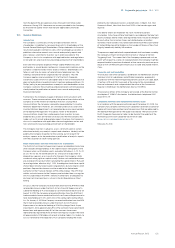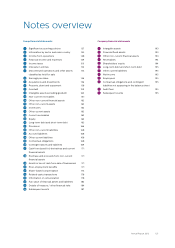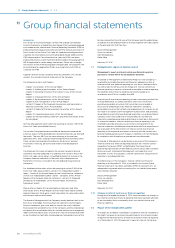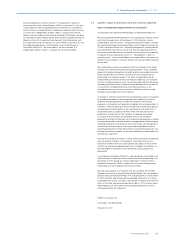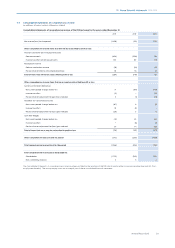Philips 2013 Annual Report Download - page 124
Download and view the complete annual report
Please find page 124 of the 2013 Philips annual report below. You can navigate through the pages in the report by either clicking on the pages listed below, or by using the keyword search tool below to find specific information within the annual report.10 Corporate governance 10.4 - 10.4
124 Annual Report 2013
of 2013. Their decision follows the entry into force of new legislation on
July 1, 2013 which provides a legal basis in Dutch law for shareholder
communication.
Preference shares and the Stichting Preferente Aandelen Philips
As a means to protect the Company and its stakeholders against an
unsolicited attempt to obtain (de facto) control of the Company, the
General Meeting of Shareholders in 1989 adopted amendments to the
Company’s Articles of Association that allow the Board of Management
and the Supervisory Board to issue (rights to) preference shares to a third
party. As a result, the Stichting Preferente Aandelen Philips (the
‘Foundation’) was created, which was granted the right to acquire
preference shares in the Company. The mere notification that the
Foundation wishes to exercise its rights, should a third party ever seem
likely in the judgment of the Foundation to obtain (de facto) control of the
Company, will result in the preference shares being eectively issued. The
Foundation may exercise this right for as many preference shares as there
are ordinary shares in the Company outstanding at that time. No
preference shares have been issued as of December 31, 2013. In addition,
the Foundation has the right to file a petition with the Enterprise Chamber
of the Amsterdam Court of Appeal to commence an inquiry procedure
within the meaning of section 2:344 Dutch Civil Code.
The object of the Foundation is to represent the interests of the Company,
the enterprises maintained by the Company and its affiliated companies
within the Group, in such a way that the interests of Philips, those
enterprises and all parties involved with them are safeguarded as
eectively as possible, and that they are aorded maximum protection
against influences which, in conflict with those interests, may undermine
the autonomy and identity of Philips and those enterprises, and also to do
anything related to the above ends or conducive to them. In the event of
(an attempt at) a hostile takeover or other attempt to obtain (de facto)
control of the Company this arrangement will allow the Company and its
Board of Management and Supervisory Board to determine its position in
relation to the third party and its plans, seek alternatives and defend
Philips’ interests and those of its stakeholders from a position of strength.
The members of the self-electing Board of the Foundation are Messrs S.D.
de Bree, F.J.G.M. Cremers and M.W. den Boogert. No Philips board
members or officers are represented on the board of the Foundation.
The Company does not have any other anti-takeover measures in the
sense of other measures which exclusively or almost exclusively have the
purpose of frustrating future public bids for the shares in the capital of the
Company in case no agreement is reached with the Board of Management
on such public bid. Furthermore, the Company does not have measures
which specifically have the purpose of preventing a bidder who has
acquired 75% of the shares in the capital of the Company from appointing
or dismissing members of the Board of Management and subsequently
amending the Articles of Association of the Company. It should be noted
that also in the event of (an attempt at) a hostile takeover or other attempt
to obtain (de facto) control of the Company, the Board of Management
and the Supervisory Board are authorized to exercise in the interests of
Philips all powers vested in them.
Audit of the financial reporting and the position of the external auditor
The annual financial statements are prepared by the Board of
Management and reviewed by the Supervisory Board upon the advice of
its Audit Committee and taking into account the report of the external
auditor. Upon approval by the Supervisory Board, the accounts are signed
by all members of both the Board of Management and the Supervisory
Board and are published together with the final opinion of the external
auditor. The Board of Management is responsible, under the supervision
of the Supervisory Board, for the quality and completeness of such
publicly disclosed financial reports. The annual financial statements are
presented for discussion and adoption to the Annual General Meeting of
Shareholders, to be convened subsequently. The Company, under US
securities regulations, separately files its Annual Report on Form 20-F,
incorporating major parts of the Annual Report as prepared under the
requirements of Dutch law.
Internal controls and disclosure policies
Comprehensive internal procedures, compliance with which is supervised
by the Supervisory Board, are in place for the preparation and publication
of the Annual Report, the annual accounts, the quarterly figures and ad
hoc financial information. As from 2003, the internal assurance process for
business risk assessment has been strengthened and the review
frequency has been upgraded to a quarterly review cycle, in line with best
practices in this area.
As part of these procedures, a Disclosure Committee has been appointed
by the Board of Management to oversee the Company’s disclosure
activities and to assist the Executive Committee in fulfilling its
responsibilities in this respect. The Committee’s purpose is to ensure that
the Company implements and maintains internal procedures for the
timely collection, evaluation and disclosure, as appropriate, of
information potentially subject to public disclosure under the legal,
regulatory and stock exchange requirements to which the Company is
subject. Such procedures are designed to capture information that is
relevant to an assessment of the need to disclose developments and risks
that pertain to the Company’s various businesses, and their eectiveness
for this purpose will be reviewed periodically.
Auditor information
In accordance with the procedures laid down in the Philips Auditor Policy
and as mandatorily required by Dutch law, the external auditor of the
Company is appointed by the General Meeting of Shareholders on the
proposal of the Supervisory Board, after the latter has been advised by the
Audit Committee and the Board of Management. Under this Auditor
Policy, as updated in 2013, the Supervisory Board and the Audit
Committee assesses the functioning of the external auditor. The main
conclusions of this assessment shall be communicated to the General
Meeting of Shareholders for the purposes of assessing the nomination for
the appointment of the external auditor. The current auditor of the
Company, KPMG Accountants N.V., was appointed by the 1995 General
Meeting of Shareholders. In 2002, when the Auditor Policy was adopted,
the appointment of KPMG Accountants N.V. was confirmed by the
Supervisory Board for an additional three years. The 2008 and 2011
General Meeting of Shareholders resolved to re-appoint KPMG
Accountants N.V. as auditor. Mr J.F.C. van Everdingen is the current partner
of KPMG Accountants N.V. in charge of the audit duties for Philips. The
external auditor shall attend the Annual General Meeting of Shareholders.
Questions may be put to him at the meeting about his report. The Board of
Management and the Audit Committee of the Supervisory Board shall
report on their dealings with the external auditor to the Supervisory Board
on an annual basis, particularly with regard to the auditor’s independence.
The Supervisory Board shall take this into account when deciding upon its
nomination for the appointment of an external auditor. New Dutch
legislation on mandatory auditor rotation will become eective January 1,
2016, meaning the Company must engage a new audit firm for its statutory
audit starting per January 1, 2016.
The external auditor attends, in principle, all meetings of the Audit
Committee. The findings of the external auditor, the audit approach and
the risk analysis are also discussed at these meetings. The external auditor
attends the meeting of the Supervisory Board at which the report of the
external auditor with respect to the audit of the annual accounts is
discussed, and at which the annual accounts are approved. In its audit
report on the annual accounts to the Board of Management and the
Supervisory Board, the external auditor refers to the financial reporting
risks and issues that were identified during the audit, internal control
matters, and any other matters, as appropriate, requiring communication
under the auditing and other standards generally accepted in the
Netherlands and the US.
Auditor policy
New Dutch legislation, eective January 1, 2013, has been adopted on the
separation of audit and non-audit services, meaning the Company’s
external auditor is no longer allowed to provide non-audit services, with
an exception for non-audit service arrangements already in place on
December 31, 2012. In light of this new Dutch legislation, the Auditor Policy
was updated in 2013. The policy is published on the Company’s website.
The policy is also in line with US Securities and Exchange Commission
rules under which the appointed external auditor must be independent of
the Company both in fact and appearance.
The Auditor Policy includes rules for the pre-approval by the Audit
Committee of all services to be provided by the external auditor. Proposed
services may be pre-approved at the beginning of the year by the Audit
Committee (annual pre-approval) or may be pre-approved during the
year by the Audit Committee in respect of a particular engagement
(specific pre-approval). The annual pre-approval is based on a detailed,
itemized list of services to be provided, designed to ensure that there is no
management discretion in determining whether a service has been
approved and to ensure the Audit Committee is informed of each services
it is pre-approving. Unless pre-approval with respect to a specific service
has been given at the beginning of the year, each proposed service
requires specific pre-approval during the year. Any annually pre-
approved services where the fee for the engagement is expected to
exceed pre-approved cost levels or budgeted amounts will also require
specific pre-approval. The term of any annual pre-approval is 12 months













